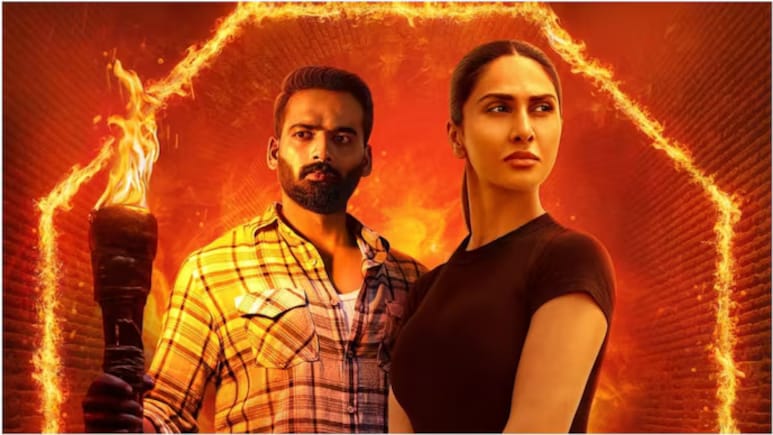
Every time a new show drops with words like "mandala," "sacrifice," and "secret cult" thrown into the mix, you expect either a transcendental mind-bender or a beautifully shot mess.
Netflix's Mandala Murders, created by Mardaani 2 director Gopi Puthran, flirts dangerously with both.
It's like the show is standing at a crossroads, one path leads to a gripping genre-bending thriller, the other to a rabbit hole of overwrought philosophy.
What we end up getting is an ambitious but flawed hybrid: one part crime procedural, one part occult noir, and one part fever dream stitched together with blood, dust and a dash of half-baked particle physics.
Set in the fictional town of Charandaspur, Mandala Murders opens with a crime straight out of a horror folktale, a decapitated body bobbing gently in a village pond, setting off a string of ritualistic killings that pull us across decades, from post-Independence India to a particularly sinister present.
The crimes, drenched in gore and carried out with methodical precision, are linked to a secretive cult from the 1950s called Ayastha Mandala. These spiritual radicals believe in a dark god named Yast, who demands death in return for fulfilled wishes.
But this isn't just a whodunit, it's a sprawling eight-episode saga where no timeline is sacred, no backstory too bizarre, and no metaphor left unexplored.
Enter Vikram Singh (Vaibhav Raj Gupta), a suspended Delhi Police officer with a haunted past and a stoic frown that rarely leaves his face.
Vikram, who returns to his hometown after years, becomes an unlikely partner to Rea Thomas (Vaani Kapoor), a sharp but emotionally brittle CIB officer, who arrives in Charandaspur to untangle the growing pattern of grisly murders.
Rea, grappling with unresolved trauma, finds herself not just chasing a killer, but a legacy of violence rooted deep in the town's psyche.
Also lurking in this shadowy world are Ananya (Surveen Chawla), a power-hungry local politician with a veiled history, a machine that grants wishes but demands thumbs in return, a priest who seems to know more than he lets on and a psychic who communes with shadows.
Despite the promise of this universe, the series never quite manages to find tonal harmony. Visually, there's no denying the atmospheric strength.
The dusty alleys, foreboding forests, and antique books bound in secrets set the stage for something uniquely Indian and myth-soaked.
There's ambition in the detailing, from the eerily sterile interiors of the cult's hidden sanctum to the bruised colours of flashback sequences that ground the show's historical elements.
Even the cinematography attempts to keep you on edge, and it works until the writing stretches itself too thin.
With each episode, Mandala Murders tries to weave together a vast narrative tapestry: trauma, caste, patriarchy, systemic decay, spiritual longing, and scientific ambition all make their way into the plot.
But what begins as layered storytelling soon becomes convoluted. The show often gets tangled in its own timeline-switching structure, leading to stretches where tension gives way to confusion.
Characters are introduced with intrigue, but then fade without resolution or significance. Motivations are hinted at, but not explored with enough depth. By the time you find your bearings in one thread, the show has already jumped to another.
That said, Vaibhav Raj Gupta brings an impressive stillness to Vikram. His performance anchors the series whenever it threatens to spiral.
Vaani Kapoor, making her OTT debut with this series, is a mixed bag. While she manages restraint and looks the part of a cop with quiet fury, the emotional beats often feel undercooked.
She excels more in her brief double role as physicist Nandini, a character that bizarrely appears as part of a narrative twist, than as Rea, who remains slightly too aloof to connect with fully. Surveen Chawla gives Ananya a simmering tension, but her arc is left hanging just when it starts getting interesting.
The biggest problem Mandala Murders faces is not in its ambition, but in its inability to control it. The series aims for profundity, using the mandala as a symbol of order, chaos, sacrifice, and belief, but its script is so stuffed with concepts that few are given the space to breathe. And then there's the gore.
The show does not shy away from body horror. Torsos without heads, heads without bodies, severed thumbs and stitched limbs are all paraded before the viewer with clinical, almost fetishistic precision.
At first, it shocks. But eventually, it numbs, a symptom of overuse, not just of violence, but of style over substance.
And yet, there's something about the sheer audacity of it all that holds your attention. Whether it's a politician tormented by her past, a child sucked into ritualistic bloodlust, or a machine that literally makes wishes come true (at a grotesque cost), the show throws curveballs with a conviction that's almost admirable. Some land. Others don't. But the boldness remains.
In the end, Mandala Murders is less a whodunit and more a what-is-happening. It builds a compelling world and then loses its way trying to make it mean too much.
A shorter run, a tighter script, and fewer tangents could've turned this from a curious thriller into something truly unforgettable. As it stands, it's a fascinating mess, occasionally brilliant, often frustrating and always drenched in blood and questions.
-
Vaani Kapoor, Vaibhav Raj Gupta, Surveen Chawla
